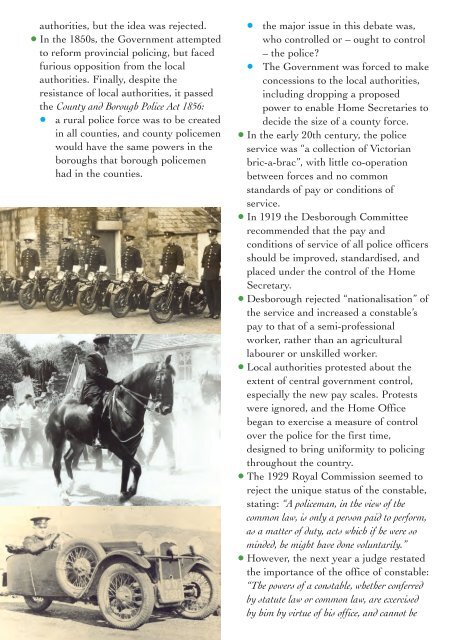The Office of Constable - Police Federation
The Office of Constable - Police Federation
The Office of Constable - Police Federation
Create successful ePaper yourself
Turn your PDF publications into a flip-book with our unique Google optimized e-Paper software.
authorities, but the idea was rejected.<br />
l In the 1850s, the Government attempted<br />
to reform provincial policing, but faced<br />
furious opposition from the local<br />
authorities. Finally, despite the<br />
resistance <strong>of</strong> local authorities, it passed<br />
the County and Borough <strong>Police</strong> Act 1856:<br />
l a rural police force was to be created<br />
in all counties, and county policemen<br />
would have the same powers in the<br />
boroughs that borough policemen<br />
had in the counties.<br />
l the major issue in this debate was,<br />
who controlled or – ought to control<br />
– the police?<br />
l <strong>The</strong> Government was forced to make<br />
concessions to the local authorities,<br />
including dropping a proposed<br />
power to enable Home Secretaries to<br />
decide the size <strong>of</strong> a county force.<br />
l In the early 20th century, the police<br />
service was “a collection <strong>of</strong> Victorian<br />
bric-a-brac”, with little co-operation<br />
between forces and no common<br />
standards <strong>of</strong> pay or conditions <strong>of</strong><br />
service.<br />
l In 1919 the Desborough Committee<br />
recommended that the pay and<br />
conditions <strong>of</strong> service <strong>of</strong> all police <strong>of</strong>ficers<br />
should be improved, standardised, and<br />
placed under the control <strong>of</strong> the Home<br />
Secretary.<br />
l Desborough rejected “nationalisation” <strong>of</strong><br />
the service and increased a constable’s<br />
pay to that <strong>of</strong> a semi-pr<strong>of</strong>essional<br />
worker, rather than an agricultural<br />
labourer or unskilled worker.<br />
l Local authorities protested about the<br />
extent <strong>of</strong> central government control,<br />
especially the new pay scales. Protests<br />
were ignored, and the Home <strong>Office</strong><br />
began to exercise a measure <strong>of</strong> control<br />
over the police for the first time,<br />
designed to bring uniformity to policing<br />
throughout the country.<br />
l <strong>The</strong> 1929 Royal Commission seemed to<br />
reject the unique status <strong>of</strong> the constable,<br />
stating: “A policeman, in the view <strong>of</strong> the<br />
common law, is only a person paid to perform,<br />
as a matter <strong>of</strong> duty, acts which if he were so<br />
minded, he might have done voluntarily.”<br />
l However, the next year a judge restated<br />
the importance <strong>of</strong> the <strong>of</strong>fice <strong>of</strong> constable:<br />
“<strong>The</strong> powers <strong>of</strong> a constable, whether conferred<br />
by statute law or common law, are exercised<br />
by him by virtue <strong>of</strong> his <strong>of</strong>fice, and cannot be
















